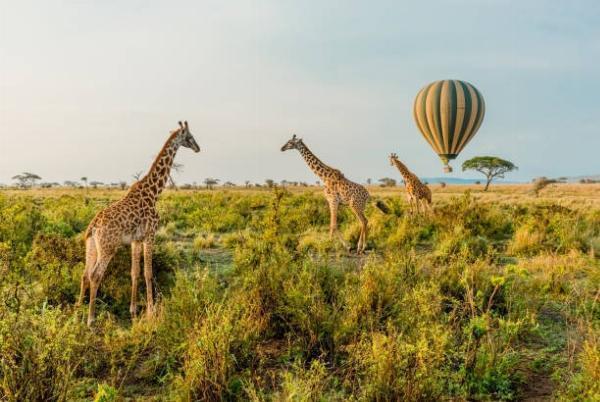5 Unique Cultural Experiences in Tanzania

Strong 8k brings an ultra-HD IPTV experience to your living room and your pocket.
Tanzania is a land of breathtaking landscapes, rich wildlife, and vibrant cultures. While most travelers are drawn to its famous safaris and stunning beaches, the country's cultural tapestry is just as captivating. From the ancient traditions of the Maasai to the colorful markets of Zanzibar, Tanzania offers a wealth of cultural experiences that can provide a deeper connection to the land and its people. In this blog, we'll explore five unique cultural experiences that you shouldn't miss during your Tanzania 7 day tour. These experiences will not only enrich your journey but also offer a glimpse into the diverse and fascinating cultures that make Tanzania so special.
1. Immerse Yourself in Maasai Culture
No visit to Tanzania would be complete without experiencing the culture of the Maasai, one of the most iconic and well-known tribes in Africa. The Maasai are renowned for their distinctive customs, dress, and semi-nomadic lifestyle, which have remained largely unchanged for centuries. Spending time with the Maasai is an opportunity to learn about their way of life, their deep connection to the land, and their rich traditions.
Many tours offer visits to Maasai villages, where you can meet the villagers, learn about their daily routines, and participate in traditional activities. One of the most memorable experiences is watching the Maasai perform their famous jumping dance, known as the "Adumu." This dance is part of a ritual to demonstrate strength and endurance, and it's incredible to witness the energy and rhythm of the Maasai warriors as they leap high into the air.
During your visit, you can also explore the Maasai's traditional homes, called "manyattas," which are made from mud, sticks, and cow dung. The Maasai women are known for their intricate beadwork, and you may have the chance to try your hand at making beaded jewelry or purchase some as a souvenir.
For a more immersive experience, consider staying overnight in a Maasai village or participating in a cultural walking tour with a Maasai guide. This will give you a deeper understanding of their connection to the environment and their knowledge of the local flora and fauna. Whether you're visiting the Maasai in the Ngorongoro Conservation Area, the Serengeti, or another part of Tanzania, this cultural experience is sure to leave a lasting impression on your Tanzania 7 day tour.
2. Explore the Swahili Culture of Zanzibar
Zanzibar, an archipelago off the coast of Tanzania, is a melting pot of cultures, with influences from Africa, Arabia, Persia, and India. The island's unique blend of cultures is most evident in its capital, Stone Town, a UNESCO World Heritage site known for its winding streets, historic buildings, and vibrant markets.
Exploring Stone Town is like stepping back in time. The town's narrow alleys are lined with beautiful Swahili houses, many of which feature intricately carved wooden doors and balconies. As you wander through the streets, you'll encounter the sights and sounds of daily life in Zanzibar, from the call to prayer from the mosques to the bustling markets where vendors sell everything from fresh spices to handmade crafts.
One of the highlights of visiting Zanzibar is experiencing the island's rich culinary heritage. The fusion of African, Arab, and Indian influences has resulted in a unique cuisine that is both flavorful and diverse. Don't miss the chance to try some of the local dishes, such as "pilau" (spiced rice), "urojo" (a tangy soup), and "zanzibar pizza" (a stuffed pastry). For a truly immersive experience, consider taking a cooking class where you can learn to prepare these dishes yourself.
Zanzibar is also known for its vibrant music and dance traditions, which are an integral part of Swahili culture. "Taarab" music, a genre that blends African, Arab, and Indian influences, is particularly popular on the island. You can catch a live Taarab performance at one of Stone Town's cultural centers or during one of the island's many festivals.
For a deeper understanding of Zanzibar's history and culture, consider visiting some of the island's museums and historic sites, such as the Old Fort, the House of Wonders, and the Sultan's Palace. Whether you're exploring the lively streets of Stone Town, relaxing on the island's beautiful beaches, or enjoying a traditional Swahili meal, Zanzibar offers a cultural experience that is both enriching and unforgettable.
3. Discover the Cultural Heritage of the Hadzabe and Datoga Tribes
For those seeking a truly unique and off-the-beaten-path cultural experience, a visit to the Hadzabe and Datoga tribes in the Lake Eyasi region is a must. The Hadzabe are one of the last remaining hunter-gatherer tribes in Africa, living a lifestyle that has changed little over thousands of years. The Datoga, on the other hand, are pastoralists who are known for their blacksmithing skills and traditional crafts.
Visiting the Hadzabe is like stepping back in time. The tribe's way of life is deeply connected to the natural environment, and they rely on hunting, gathering, and foraging for their survival. During your visit, you can join the Hadzabe on a hunting expedition, where you'll learn about their traditional hunting techniques, including the use of bows and arrows. The Hadzabe are skilled hunters, and they have an incredible knowledge of the local wildlife and plants, which they use for food, medicine, and shelter.
After the hunt, you can spend time with the Hadzabe around their campfire, listening to their stories and learning about their culture. The Hadzabe speak a click language, which is fascinating to hear, and they are known for their music and dance, which are an integral part of their social life.
Nearby, the Datoga tribe offers a different cultural experience. The Datoga are skilled blacksmiths, and you can visit their workshops to see them at work, forging tools, weapons, and jewelry from scrap metal. The Datoga women are also known for their intricate beadwork, and you can watch them create beautiful necklaces, bracelets, and other traditional items.
A visit to the Hadzabe and Datoga tribes provides a rare opportunity to experience two distinct and ancient cultures that have remained largely unchanged by the modern world. It's a humbling and enriching experience that will give you a deeper appreciation for the diversity of human cultures and the resilience of traditional ways of life. If you're planning a Tanzania 7 day tour, be sure to include a visit to Lake Eyasi and its unique cultural heritage.
4. Participate in a Traditional Coffee Ceremony with the Chagga People
Coffee is an integral part of Tanzanian culture, and nowhere is this more evident than in the foothills of Mount Kilimanjaro, where the Chagga people have been cultivating coffee for centuries. The Chagga are one of Tanzania's largest ethnic groups, and their traditional coffee ceremony is a cultural experience that offers insight into their way of life and the significance of coffee in their society.
The Chagga people live in small villages on the slopes of Kilimanjaro, where they grow coffee alongside bananas, maize, and other crops. When you visit a Chagga village, you'll be welcomed into a traditional home, where you'll have the opportunity to participate in a coffee ceremony that has been passed down through generations.
The ceremony begins with the roasting of raw coffee beans over an open fire. As the beans roast, they release a rich, aromatic smoke that fills the room. Once the beans are roasted to perfection, they are ground by hand using a traditional wooden mortar and pestle. The ground coffee is then brewed in a pot of boiling water, creating a strong and flavorful brew.
As you sip the freshly brewed coffee, you'll learn about the history of coffee cultivation in the region, as well as the cultural and economic importance of coffee to the Chagga people. The Chagga have a deep respect for the land and its resources, and they have developed sustainable farming practices that have allowed them to thrive in the challenging environment of Kilimanjaro's slopes.
In addition to the coffee ceremony, you can explore the Chagga's traditional farming methods, visit local markets, and learn about their crafts and music. The Chagga are known for their hospitality, and you'll leave with a deeper understanding of their culture and way of life.
Participating in a traditional coffee ceremony with the Chagga people is a unique cultural experience that offers a taste of Tanzania's rich agricultural heritage. It's a perfect addition to your Tanzania 7 day tour, especially if you're planning to hike Kilimanjaro or explore the surrounding area.
5. Experience the Vibrant Culture of the Sukuma People
The Sukuma are Tanzania's largest ethnic group, and their culture is as vibrant and diverse as the landscapes of the country itself. The Sukuma people live in the northwestern part of Tanzania, near Lake Victoria, and their traditional practices, music, and dance are an integral part of their identity.
One of the most captivating aspects of Sukuma culture is their dance traditions, which are performed during various ceremonies and celebrations. The Sukuma are known for their energetic and elaborate dance performances, which often involve acrobatics, drumming, and the use of traditional instruments. One of the most famous dances is the "Bugobogobo," a snake dance performed by dancers who handle live snakes as part of the performance. Watching a Sukuma dance performance is a thrilling experience that showcases the skill, creativity, and cultural pride of the Sukuma people.
In addition to their dance traditions, the Sukuma are also known for their traditional medicine practices. The Sukuma believe in the power of herbs and natural remedies to heal the body and spirit, and traditional healers, known as "Bafumu," play an important role in their communities. Visiting a Sukuma healer offers a fascinating insight into the traditional medical practices of the region, and you may even have the opportunity to learn about some of the herbs and plants used in their treatments.
Note: IndiBlogHub features both user-submitted and editorial content. We do not verify third-party contributions. Read our Disclaimer and Privacy Policyfor details.


